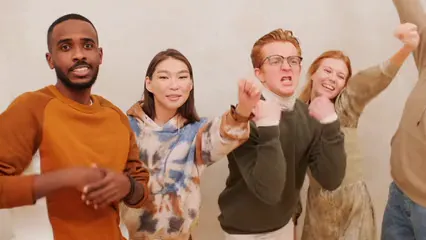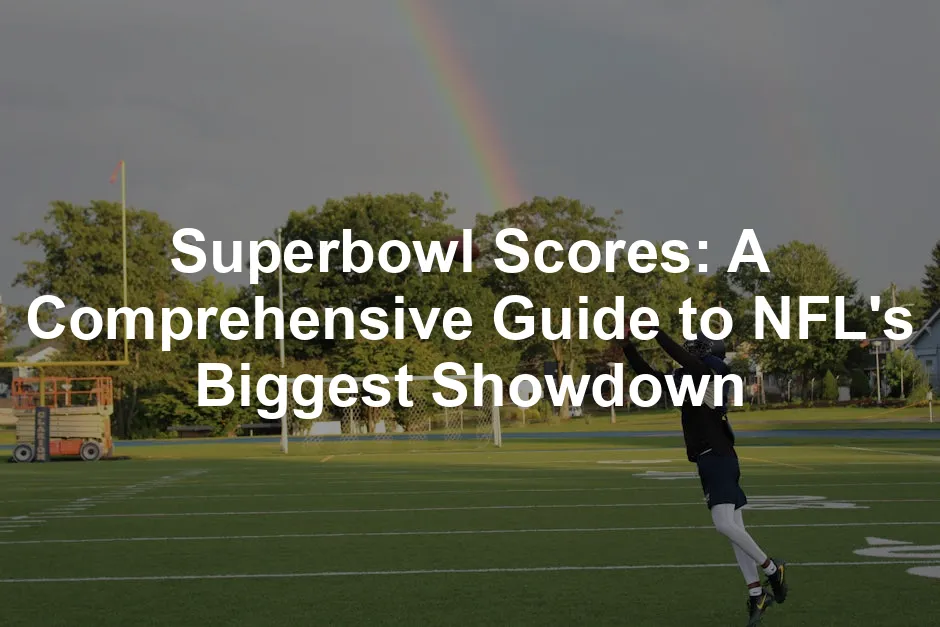Introduction
The Super Bowl is the grand finale of the NFL season, a dazzling spectacle that captures the hearts of millions. It’s not merely a football game; it’s an event that has transcended sports, merging into American culture. Picture this: fans gathered, snacks piled high, and the excitement in the air palpable. Each Super Bowl tells a unique story, but one constant remains—the scores.
These numbers are more than mere digits. They reflect triumph, heartbreak, and unforgettable moments etched in the annals of sports history. Whether you’re a die-hard fan or someone just tuning in for the halftime show, understanding past Super Bowl scores enriches your appreciation of the game.
From the first Super Bowl in 1967, where the Green Bay Packers triumphed over the Kansas City Chiefs, to recent nail-biters, the scores reveal the progression of the league and its teams. Who can forget the 2023 showdown, where the Kansas City Chiefs edged out the Philadelphia Eagles in a thrilling 38-35 victory? These scores shape narratives, define rivalries, and influence legacies.
In this article, we’ll embark on a journey through Super Bowl scores, diving into the winners, losers, and the unforgettable moments that have shaped the NFL. Get ready to pass the popcorn as we break down everything you need to know about Super Bowl scores! From the highest-scoring games to trends that illustrate how strategies have evolved, we’ll cover it all. So, buckle up and enjoy the ride through the exhilarating world of NFL’s biggest showdown!

The Evolution of the Super Bowl
Origins and Growth of the Super Bowl
The Super Bowl kicked off its grand journey on January 15, 1967. This first matchup, known as Super Bowl I, pitted the Green Bay Packers against the Kansas City Chiefs. The Packers triumphed with a score of 35-10, marking the start of a legendary tradition. Not only did this game crown the first champion, but it also captured America’s attention, establishing the Super Bowl as a must-see event.
Fast forward to 1970, and we saw the merger of the NFL and AFL, which forever changed the landscape of professional football. This merger brought about the formation of the Super Bowl as we know it today—a matchup between the best teams from the American Football Conference (AFC) and the National Football Conference (NFC). Super Bowl III in 1969 was a game-changer, as Joe Namath’s New York Jets upset the Baltimore Colts, solidifying the Super Bowl’s place in sports history.
Notable milestones include the 1972 Miami Dolphins, who achieved the only perfect season in NFL history, culminating in their Super Bowl VII victory. The 1980s saw the rise of dynasties, with the San Francisco 49ers and New York Giants claiming multiple victories. The 1990s brought new teams into the spotlight, with the Dallas Cowboys and Green Bay Packers dominating the era.
In the early 2000s, the New England Patriots, led by Tom Brady, reshaped the narrative of the Super Bowl with their unprecedented success. Each decade has added its own flavor, from glitzy halftime shows to unforgettable commercials, transforming the Super Bowl into a cultural phenomenon.
Speaking of flavor, why not spice up your Super Bowl party with some delicious snacks? Check out this Football Game Day Snacks Variety Pack. It’s the perfect way to keep your guests fueled up while they cheer for their favorite teams!
Today, the Super Bowl attracts millions of viewers worldwide. It’s not just the game; it’s the entire experience—parties, food, and even a bit of friendly rivalry. As we look ahead, the Super Bowl continues to evolve, promising new stories and unforgettable moments for fans to cherish.

Super Bowl Scores by Year
Comprehensive Score Table
| Date | Winning Team | Winning Score | Losing Team | Losing Score | MVP | Venue |
|---|---|---|---|---|---|---|
| Jan. 15, 1967 | Green Bay Packers | 35 | Kansas City Chiefs | 10 | Bart Starr | Los Angeles Memorial Coliseum |
| Jan. 14, 1968 | Green Bay Packers | 33 | Oakland Raiders | 14 | Bart Starr | Miami Orange Bowl |
| Jan. 12, 1969 | New York Jets | 16 | Baltimore Colts | 7 | Joe Namath | Miami Orange Bowl |
| Jan. 11, 1970 | Kansas City Chiefs | 23 | Minnesota Vikings | 7 | Len Dawson | Tulane Stadium |
| Jan. 17, 1971 | Baltimore Colts | 16 | Dallas Cowboys | 13 | Chuck Howley | Miami Orange Bowl |
| Jan. 16, 1972 | Dallas Cowboys | 24 | Miami Dolphins | 3 | Roger Staubach | Tulane Stadium |
| Jan. 14, 1973 | Miami Dolphins | 14 | Washington | 7 | Jake Scott | Los Angeles Memorial Coliseum |
| Jan. 13, 1974 | Miami Dolphins | 24 | Minnesota Vikings | 7 | Larry Csonka | Rice Stadium |
| Jan. 12, 1975 | Pittsburgh Steelers | 16 | Minnesota Vikings | 6 | Franco Harris | Tulane Stadium |
| Jan. 18, 1976 | Pittsburgh Steelers | 21 | Dallas Cowboys | 17 | Lynn Swann | Orange Bowl |
| Jan. 9, 1977 | Oakland Raiders | 32 | Minnesota Vikings | 14 | Fred Biletnikoff | Rose Bowl |
| Jan. 15, 1978 | Dallas Cowboys | 27 | Denver Broncos | 10 | Harvey Martin | Superdome |
| Jan. 21, 1979 | Pittsburgh Steelers | 35 | Dallas Cowboys | 31 | Terry Bradshaw | Orange Bowl |
| Jan. 20, 1980 | Pittsburgh Steelers | 31 | Los Angeles Rams | 19 | Terry Bradshaw | Rose Bowl |
| Jan. 25, 1981 | Oakland Raiders | 27 | Philadelphia Eagles | 10 | Jim Plunkett | Louisiana Superdome |
| Jan. 24, 1982 | San Francisco 49ers | 26 | Cincinnati Bengals | 21 | Joe Montana | Pontiac Silverdome |
| Jan. 30, 1983 | Washington | 27 | Miami Dolphins | 17 | John Riggins | Rose Bowl |
| Jan. 22, 1984 | Los Angeles Raiders | 38 | Washington | 9 | Marcus Allen | Tampa Stadium |
| Jan. 20, 1985 | San Francisco 49ers | 38 | Miami Dolphins | 16 | Joe Montana | Stanford Stadium |
| Jan. 26, 1986 | Chicago Bears | 46 | New England Patriots | 10 | Richard Dent | Louisiana Superdome |
| Jan. 25, 1987 | New York Giants | 39 | Denver Broncos | 20 | Phil Simms | Rose Bowl |
| Jan. 31, 1988 | Washington | 42 | Denver Broncos | 10 | Doug Williams | Jack Murphy Stadium |
| Jan. 22, 1989 | San Francisco 49ers | 20 | Cincinnati Bengals | 16 | Jerry Rice | Joe Robbie Stadium |
| Jan. 28, 1990 | San Francisco 49ers | 55 | Denver Broncos | 10 | Joe Montana | Louisiana Superdome |
| Jan. 27, 1991 | New York Giants | 20 | Buffalo Bills | 19 | Ottis Anderson | Tampa Stadium |
| Jan. 26, 1992 | Washington | 37 | Buffalo Bills | 24 | Mark Rypien | Metrodome |
| Jan. 31, 1993 | Dallas Cowboys | 52 | Buffalo Bills | 17 | Troy Aikman | Rose Bowl |
| Jan. 30, 1994 | Dallas Cowboys | 30 | Buffalo Bills | 13 | Emmitt Smith | Georgia Dome |
| Jan. 29, 1995 | San Francisco 49ers | 49 | San Diego Chargers | 26 | Steve Young | Joe Robbie Stadium |
| Jan. 28, 1996 | Dallas Cowboys | 27 | Pittsburgh Steelers | 17 | Larry Brown | Sun Devil Stadium |
| Jan. 26, 1997 | Green Bay Packers | 35 | New England Patriots | 21 | Desmond Howard | Louisiana Superdome |
| Jan. 25, 1998 | Denver Broncos | 31 | Green Bay Packers | 24 | Terrell Davis | Qualcomm Stadium |
| Jan. 31, 1999 | Denver Broncos | 34 | Atlanta Falcons | 19 | John Elway | Pro Player Stadium |
| Jan. 30, 2000 | St. Louis Rams | 23 | Tennessee Titans | 16 | Kurt Warner | Georgia Dome |
| Jan. 28, 2001 | Baltimore Ravens | 34 | New York Giants | 7 | Ray Lewis | Raymond James Stadium |
| Feb. 3, 2002 | New England Patriots | 20 | St. Louis Rams | 17 | Tom Brady | Louisiana Superdome |
| Jan. 26, 2003 | Tampa Bay Buccaneers | 48 | Oakland Raiders | 21 | Dexter Jackson | Qualcomm Stadium |
| Feb. 1, 2004 | New England Patriots | 32 | Carolina Panthers | 29 | Tom Brady | Reliant Stadium |
| Feb. 6, 2005 | New England Patriots | 24 | Philadelphia Eagles | 21 | Deion Branch | Alltel Stadium |
| Feb. 5, 2006 | Pittsburgh Steelers | 21 | Seattle Seahawks | 10 | Hines Ward | Ford Field |
| Feb. 4, 2007 | Indianapolis Colts | 29 | Chicago Bears | 17 | Peyton Manning | Dolphin Stadium |
| Feb. 3, 2008 | New York Giants | 17 | New England Patriots | 14 | Eli Manning | University of Phoenix Stadium |
| Feb. 1, 2009 | Pittsburgh Steelers | 27 | Arizona Cardinals | 23 | Santonio Holmes | Raymond James Stadium |
| Feb. 7, 2010 | New Orleans Saints | 31 | Indianapolis Colts | 17 | Drew Brees | Sun Life Stadium |
| Feb. 6, 2011 | Green Bay Packers | 31 | Pittsburgh Steelers | 25 | Aaron Rodgers | Cowboys Stadium |
| Feb. 5, 2012 | New York Giants | 21 | New England Patriots | 17 | Eli Manning | Lucas Oil Stadium |
| Feb. 3, 2013 | Baltimore Ravens | 34 | San Francisco 49ers | 31 | Joe Flacco | Mercedes-Benz Superdome |
| Feb. 2, 2014 | Seattle Seahawks | 43 | Denver Broncos | 8 | Malcolm Smith | MetLife Stadium |
| Feb. 1, 2015 | New England Patriots | 28 | Seattle Seahawks | 24 | Tom Brady | University of Phoenix Stadium |
| Feb. 7, 2016 | Denver Broncos | 24 | Carolina Panthers | 10 | Von Miller | Levi’s Stadium |
| Feb. 5, 2017 | New England Patriots | 34 | Atlanta Falcons | 28 | Tom Brady | NRG Stadium |
| Feb. 4, 2018 | Philadelphia Eagles | 41 | New England Patriots | 33 | Nick Foles | U.S. Bank Stadium |
| Feb. 3, 2019 | New England Patriots | 13 | Los Angeles Rams | 3 | Julian Edelman | Mercedes-Benz Stadium |
| Feb. 2, 2020 | Kansas City Chiefs | 31 | San Francisco 49ers | 20 | Patrick Mahomes | Hard Rock Stadium |
| Feb. 7, 2021 | Tampa Bay Buccaneers | 31 | Kansas City Chiefs | 9 | Tom Brady | Raymond James Stadium |
| Feb. 13, 2022 | Los Angeles Rams | 23 | Cincinnati Bengals | 20 | Cooper Kupp | SoFi Stadium |
| Feb. 12, 2023 | Kansas City Chiefs | 38 | Philadelphia Eagles | 35 | Patrick Mahomes | State Farm Stadium |
| Feb. 11, 2024 | Kansas City Chiefs | 25 | San Francisco 49ers | 22 | Patrick Mahomes | Allegiant Stadium |
Standout games include the classic matchup between the San Francisco 49ers and the San Diego Chargers in 1995, where a staggering 75 points were scored. The 2018 battle saw the Eagles take down the Patriots in a thrilling 41-33 game, showcasing the resilience of both teams. Understanding these super bowl 50 statistics can enhance your appreciation of the game.
The Super Bowl is not just about the scores; it’s about the stories behind them. For deeper insights, check out the super bowl 50 statistics.
Each Super Bowl offers a new narrative, with moments that will be talked about for generations. The scores tell stories of triumph, heartbreak, and the pursuit of glory in the NFL’s biggest spectacle.
Trends in Super Bowl Scores
Analysis of Scoring Trends
Super Bowl scores have evolved significantly over the years. In the early days, games often ended with lower totals. For example, Super Bowl I featured just 45 combined points. Fast forward to today, and we regularly see scores exceeding 70 points. This shift highlights a growing trend in offensive strategies.
The average score in recent years hovers around 30 points per team. This marks a noticeable increase compared to the 1970s and 1980s. The introduction of rules favoring offense has played a crucial role in these scoring upticks. For instance, changes in pass interference rules and the protection of quarterbacks have opened the floodgates for aerial assaults.
Teams now prioritize high-scoring offenses. Coaches design plays that maximize yardage and touchdowns. The result? A thrilling spectacle for fans, who have become accustomed to watching nail-biting finishes.
Moreover, the impact of analytics cannot be understated. Teams use data to determine optimal play-calling strategies, leading to more aggressive approaches. This trend reflects a shift in how teams view scoring; it’s no longer just about defense.
In essence, scoring in the Super Bowl has become a dynamic dance of strategy and execution. As teams adapt to the changing landscape of the sport, fans can expect even more exhilarating games in the future.

Notable Super Bowl Records
Record-Breaking Performances
Super Bowls are synonymous with record-breaking feats. One of the most astonishing records is the most points scored by a single team. The San Francisco 49ers set the bar high in Super Bowl XXIV, racking up an impressive 55 points against the Denver Broncos. This game showcased offensive prowess at its finest.
Touchdowns also tell a fascinating story. The New England Patriots and the Pittsburgh Steelers share the title for most touchdowns in a single game, with 6 touchdowns each. Super Bowl games often become stages for players to shine, and this record exemplifies that.
Then there’s the nail-biting close calls. Super Bowl III holds the record for the closest margin of victory. The New York Jets defeated the Baltimore Colts by just 7 points. Such suspense keeps fans on the edge of their seats, reminding us of the unpredictable nature of the sport.
These records contribute to the lore of the Super Bowl, creating a tapestry woven with unforgettable moments. They inspire players and teams to push boundaries and strive for greatness.
Want to bring some of that Super Bowl magic to your home? Consider adding a NFL Wilson Official Super Bowl Football to your collection. It’s a great way to relive those iconic moments every time you toss it around!

Impact of Scores on Team Legacies
How Scores Define Teams
Super Bowl scores play a pivotal role in shaping the legacies of teams. Historical victories carry immense significance. For instance, the New England Patriots’ comeback in Super Bowl LI defined a generation of football excellence. Trailing by 28-3, they climbed back to win in overtime, cementing their status as one of the greatest franchises.
Players also feel the weight of these scores. A standout performance can elevate a player’s career. Take Joe Montana, for example. His Super Bowl performances set a benchmark for quarterbacks. With a perfect 4-0 record and a history of clutch plays, Montana’s legacy is forever tied to those scores.
Moreover, the perception of franchises often hinges on their Super Bowl scores. Consistent high-scoring victories boost a team’s reputation. Fans embrace these moments, creating a bond that lasts for generations.
In summary, Super Bowl scores are more than just numbers. They encapsulate history, triumph, and the emotional rollercoaster of the game. Each score adds to the narrative of the NFL, ensuring that every Super Bowl is remembered not just for the outcome, but for its impact on legacies.

If you’re a fan, why not show it off? Grab yourself some NFL Football Team Apparel to wear while you cheer on your team!

Future Predictions
What Lies Ahead for the Super Bowl
The Super Bowl has always been a stage for unexpected surprises. As we look to the future, a few trends and potential changes in scoring stand out. First, we might see an increase in offensive firepower. Teams are embracing innovative strategies, focusing on fast-paced, high-scoring games. This trend reflects a broader shift in the NFL, where offenses are becoming more dynamic and unpredictable.
Next, let’s talk about the teams on the rise. The Kansas City Chiefs, who recently snagged their third Super Bowl title, are not slowing down. With Patrick Mahomes at the helm, they’re likely to remain a scoring machine. The 49ers, fresh off a strong performance in Super Bowl LVIII, also show promise. They blend a solid defense with an explosive offense, which could lead to thrilling matchups in the coming years.
Moreover, we can’t ignore the impact of emerging teams like the Detroit Lions and Miami Dolphins. Both have shown flashes of brilliance, suggesting they could disrupt the traditional powerhouses. As they refine their rosters and build momentum, watch for them to challenge for the championship soon.
Another factor to consider is the NFL’s evolving rules. Recent changes have favored offenses, leading to more scoring opportunities. Expect this trend to continue as the league seeks to captivate fans with exciting, high-scoring games.
In summary, the future of Super Bowl scoring looks promising. With offensive innovations, rising teams, and favorable rules, we could witness record-breaking performances. The excitement is building, and fans can only hope for more nail-biting finishes and unforgettable moments in the Super Bowl.

And what’s a game day without the right gear? Consider investing in a NFL Team Logo Blanket for those chilly nights when your team is playing!

Conclusion
The Super Bowl remains a cornerstone of American sports culture, evolving while maintaining its unique charm. It’s more than just a championship game; it’s a celebration of talent, endurance, and the unpredictable nature of sports. Scores play a critical role in defining each season and shaping the narratives of teams and players.
Scores determine champions and create iconic moments that resonate with fans. From the thrilling 38-35 finish in 2023 to the unforgettable 55 points scored by the 49ers in Super Bowl XXIV, each number tells a story. These scores reflect triumph, heartbreak, and the relentless pursuit of greatness.
As we look ahead, the Super Bowl will continue to adapt, promising fresh challenges and exhilarating performances. The significance of scoring will not diminish; it will only grow, intertwining with the legacies of players and franchises.
In the end, the Super Bowl is a tribute to the heart and soul of football. Every score contributes to the rich tapestry of NFL history. So, whether you’re cheering for your favorite team or just enjoying the spectacle, remember that each score is a piece of a larger story—one that fans will cherish for years to come.

FAQs
What is the highest score ever recorded in a Super Bowl?
The highest-scoring Super Bowl was Super Bowl XXIV, held on January 28, 1990. The San Francisco 49ers defeated the Denver Broncos 55-10. This game showcased the 49ers’ offensive brilliance, setting a record for points scored in a single Super Bowl. This historic matchup is significant, as it highlights the dominance of a team that was at the peak of its powers.
Which teams have the most Super Bowl wins?
The New England Patriots and the Pittsburgh Steelers are tied for the most Super Bowl victories, each with six championships. Following closely are the Dallas Cowboys and the San Francisco 49ers, both with five wins. These franchises have built legacies that are synonymous with success in the NFL, and their repeated appearances in the big game have solidified their status as powerhouses.
How often do Super Bowl scores go into overtime?
Overtime in the Super Bowl is a rare occurrence, with only two games having gone into overtime. The first was Super Bowl LI in 2017, where the New England Patriots overcame a 28-3 deficit to defeat the Atlanta Falcons 34-28. The second was more recent, Super Bowl LVIII in 2024, where the Kansas City Chiefs triumphed over the San Francisco 49ers 25-22. These thrilling finishes emphasize the high stakes and drama that define the Super Bowl.
What affects the scoring in a Super Bowl?
Several factors influence Super Bowl scoring. Team strategies play a vital role, as coaches design game plans tailored to exploit weaknesses in the opponent’s defense. Player performances are equally crucial; a star quarterback or a phenomenal wide receiver can turn the tide of a game. Weather conditions can also impact scoring, particularly in outdoor stadiums. These elements combine to create an unpredictable yet exciting atmosphere.
Where can I find a complete list of Super Bowl scores?
If you’re looking for a comprehensive list of Super Bowl scores, resources like ESPN, Pro Football Reference, and the official NFL website are excellent places to start. They provide detailed historical data, including winning and losing teams, scores, venues, and MVPs. These platforms are treasure troves for stats enthusiasts and casual fans alike, ensuring you can find the information you need to enhance your Super Bowl knowledge.
As you prepare for the next big game, don’t forget to grab your Tailgating Folding Chairs for the ultimate comfort while you enjoy the game day festivities!
Please let us know what you think about our content by leaving a comment down below!
Thank you for reading till here 🙂
All images from Pexels




